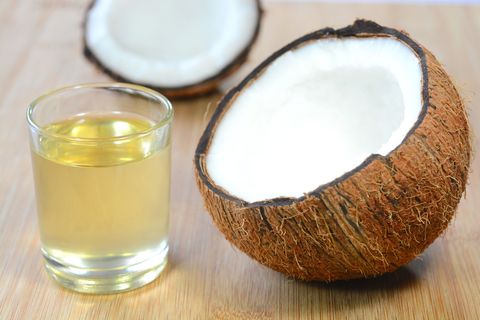
Health experts have long touted the purported benefits of coconut oil, claiming that its high fat and MCTs (medium-chain triglycerides) content can boost your health or even help you lose weight. It’s become quite the popular pantry staple, with people using it for everything from smoothies to face masks.
Shots were fired, however, when a Harvard professor made a bold statement against coconut oil, calling it “pure poison.” In a video that has gone viral, Karin Michels, a professor at the Harvard TH Chan School of Public Health, said that coconut oil not only has no proven health benefits, but is one of the “worst foods you can eat.”
Harsh — but is it true? Before tossing out your coconut oil, let’s see what the research has to say.
What is coconut oil?
Basically, coconut oil is just oil extracted from the meat of coconuts, says Laura LaValle, RDN. It contains fats known as medium chain triglycerides (MCTs), which are metabolized differently than other types of fats (more on that later). People mostly use coconut oil for cooking, particularly for high-heat cooking methods, such as stir-fry, popping popcorn, or making baked goods. You can even add it to drinks (you’ve probably seen it in a few bulletproof coffee recipes).
Does coconut oil have any proven health benefits?
Some health experts believe that coconut oil can help you lose weight. “It’s been found to boost fat-burning and provide your body and brain with quick energy,” says Maggie Michalczyk, a Chicago-based registered dietitian. This was supported by a 2009 study in the journal Lipids, which showed that women who ate coconut oil over a 12-week period lost belly fat, while people who ate soybean oil did not.
Coconut oil is full of MCTs (medium-chain triglycerides), a type of fatty acid that is rapidly absorbed and converted into fuel for the body. “A 2014 study found that MCTs increased the hunger-regulating hormones in the body that make a person feel full, compared to long-chain fatty acids,” Michalczyk says. The idea is that coconut oil could potentially increase satiety to fill you up faster, so you’ll be less inclined to mindlessly snack later in the day.
That said, these claims should be taken with a grain of salt: research on the link between coconut oil and weight loss is scant, and not every study has replicated these results. So keep in mind that adding coconut oil to your coffee is not going to help the pounds melt off you like magic.
OK, but is coconut oil bad for you?
Probably not. The bulk of Michels’ argument against coconut oil is that it contains a lot of saturated fat, which in excess has been linked to increased LDL, or “bad,” cholesterol. But recent research has thrown longstanding claims about the dangers of saturated fat into question. Other factors, such as genetics and a history of smoking, are much more likely to increase your risk of heart attack or other cardiac events.
That said, the professor does have a few points about coconut oil worth considering: a tablespoon of coconut oil has 117 calories. That’s why LaValle encourages coconut oil intake “in moderate amounts, like 1 tablespoon per day or less,” she says. If you want to cook with coconut oil, you should also opt for virgin coconut oil, which has not been subject to chemical processing.
Bottom line: coconut oil is probably fine for you in moderation, but it’s far from the superfood we’ve been led to believe it is. Feel free to try it, but don’t expect for it to yield any magical health benefits.
Source: Read Full Article